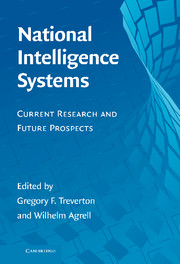Book contents
- Frontmatter
- Contents
- Preface
- 1 Introduction
- PART 1 DEFINING THE FIELD, ITS THEORY, HISTORIOGRAPHY, AND CHANGES AFTER THE COLD WAR
- 2 Building a Theory of Intelligence Systems
- 3 Reflections on Intelligence Historiography since 1939
- 4 A Theory of Intelligence and International Politics
- 5 Intelligence Analysis after the Cold War – New Paradigm or Old Anomalies?
- PART 2 RESEARCH ON NEW CHALLENGES, METHODS, AND THREATS
- PART 3 INTELLIGENCE, POLITICS, AND OVERSIGHT
- Index
- References
3 - Reflections on Intelligence Historiography since 1939
from PART 1 - DEFINING THE FIELD, ITS THEORY, HISTORIOGRAPHY, AND CHANGES AFTER THE COLD WAR
Published online by Cambridge University Press: 05 June 2012
- Frontmatter
- Contents
- Preface
- 1 Introduction
- PART 1 DEFINING THE FIELD, ITS THEORY, HISTORIOGRAPHY, AND CHANGES AFTER THE COLD WAR
- 2 Building a Theory of Intelligence Systems
- 3 Reflections on Intelligence Historiography since 1939
- 4 A Theory of Intelligence and International Politics
- 5 Intelligence Analysis after the Cold War – New Paradigm or Old Anomalies?
- PART 2 RESEARCH ON NEW CHALLENGES, METHODS, AND THREATS
- PART 3 INTELLIGENCE, POLITICS, AND OVERSIGHT
- Index
- References
Summary
Sherman Kent, the founding father of U.S. intelligence analysis, complained in 1955 that intelligence was the only profession which lacked a serious literature:
From my point of view this is a matter of greatest importance. As long as this discipline lacks a literature, its methods, its vocabulary, its body of doctrine, and even its fundamental theory run the risk of never reaching full maturity.
Practicing economists and politicians, among others, are rightly critical of the remoteness of some academic research from the real world in which they operate. However, economics without economic theory and economic history, politics without political history and political science, would be what Kent forecasted intelligence would remain without an intelligence literature: immature disciplines.
The public space left vacant by the slow growth of intelligence studies as an academic discipline was invaded by a generation of fantasists and conspiracy theorists. Intelligence thus became the only profession in which a fictional character is still many times better known than any real intelligence officer, alive or dead. That character, of course, is James Bond, who made his first appearance in Casino Royal two years before Kent's article on “The Need for an Intelligence Literature.” Bond films have since been seen and mostly enjoyed by a majority of the world's population.
THE ABSENCE OF SIGINT, OR “NO SUCH AGENCY”
Until the 1970s, the majority of the world's modern historians, political scientists, and international-relations specialists was so bemused by intelligence that it was ignored altogether.
- Type
- Chapter
- Information
- National Intelligence SystemsCurrent Research and Future Prospects, pp. 38 - 57Publisher: Cambridge University PressPrint publication year: 2009
References
- 1
- Cited by



